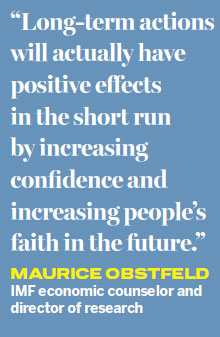IMF: China has pivotal role in 2016 economy
Updated: 2016-01-22 08:37
By Chris Peterson and Wang Mingjie in London(China Daily Europe)
|
|||||||||||
China's effort to adapt to changing realities, including its slowdown in GDP growth, is an important factor influencing the global economy in 2016, according to the International Monetary Fund.
While China's growth will slow to 6.3 percent this year and 6.0 percent by 2017, the International Monetary Fund predicts in its World Economic Outlook update.
It forecasts global growth to rise to 3.4 percent in 2016 and 3.6 percent next year.
"The pickup in global activity is projected to be more gradual than in the October World Economic Outlook, especially in emerging markets and developing economies," the IMF says.
The update adds that risks to the global outlook "remain tilted to the downside" and are related to ongoing changes in the global economy, such as a general slowdown in emerging economies, China's rebalancing, and lower commodity prices. "If these key challenges are not managed, global growth could be derailed," it warns.
Maurice Obstfeld, the IMF's economic counselor and director of research, says policymakers should be thinking about short-term resilience, but also longer-term growth prospects.
"Long-term actions will actually have positive effects in the short run by increasing confidence and increasing people's faith in the future," he says.

The IMF report says China's overall growth was evolving broadly, as forecast, although there had been a faster-than-expected slowdown in imports and exports, in part reflecting weaker investment and manufacturing activity.
It also says there are market concerns about China's future economic performance, although it says manufacturing activity and trade remain weak worldwide, not just because of China, but also because of subdued demand and a decline in investment in what it called extractive industries. The dramatic decline in imports in several emerging markets has also weighed heavily on world trade, it said.
The IMF report, written before oil prices fell even further after December, says the plummeting price of oil has strained the fiscal positions of some producing countries, while increased expectations of a sustained increase in production by OPEC members has also had an effect. The report was also written before the lifting of sanctions on Iran, which some analysts estimate could release a further 1 million barrels of crude a year onto the oil markets, further depressing the price.
Risks to be faced include a sharper-than-expected slowdown in China, which would have a knock-on effect on trade, commodity prices and confidence, and a further appreciation of the dollar, with tighter financing conditions exposing vulnerability in emerging markets. This could include adverse effects on corporate balance sheets, and fundraising problems for those with high dollar exposure.
The IMF also warns that continuing political tension in various regions could hit global trade, capital flows and tourism.
There are two sides to the decline in the commodity markets. The downside includes a worsening outlook for already fragile commodity producers, and widening yields on energy-sector debt could mean a broader tightening of credit. The upside is that a rapid decline in oil prices may lead to stronger demand in consumer countries that import oil, based in part on perceptions by the consumer that prices will stay lower for longer.
"All in all, there is a lot of uncertainty out there, and I think that contributes to the volatility," Obstfeld says. "We may be in for a bumpy ride."
Tao Wang, chief economist at UBS, says the IMF forecast for Chinese growth is neither new nor "too much out of the consensus".
"UBS forecasts 6.2 percent in 2016, and 5.8 percent in 2017," she says. "These forecasts are lower than the likely official growth target of 6.5 percent. For us, we think the ongoing property destocking and knock-on effect on the industrial sector will continue to put downward pressure on the economy, which will not likely be fully offset by policy support. In addition, the need to close zombie companies as well as reduce excess capacity will mean slower growth.
"Despite this, a China at 6.2 or 6.3 percent would still be a top contributor to global growth. One should not be surprised at, or emphasize too much, China slowing, since it is already a $10 trillion economy."
Obstfeld says at a news conference in London that China's economic rebalancing means there are "spillover effects" that are having a greater effect than envisaged; one was the effect on trade, the other on currencies.
"Currency management is one area where China's government needs to have more clear communication with the market," he says.
Robert Bergqvist, chief economist at SEB, says China's importance to the global economy and financial markets is growing, "and we must recognize that China is an economic superpower".
"This is good for the world economy, but it means also that the problems China experiences in the future will be shared by many countries," he adds.
Contact the writers through chris@mail.chinadailyuk.com
(China Daily European Weekly 01/22/2016 page3)
Today's Top News
China gives beleaguered Tsipras a helping hand
China and Gulf nations resume free trade talks
IMF starts to select new chief
Merkel insists on European solution for refugee crisis
China, Saudi Arabia sign deals on Xi's visit
Hollande announces $2.2b plan to create jobs
Chinese conductor becomes first woman in charge of BBC orchestra
Taxi drivers in Budapest protests against Uber
Hot Topics
Lunar probe , China growth forecasts, Emission rules get tougher, China seen through 'colored lens', International board,
Editor's Picks

|

|

|

|

|

|






